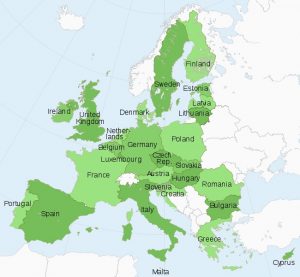Weekly Geopolitical Report – The EU at 60: Part I (April 3, 2017)
by Bill O’Grady
On March 25th, European Union (EU) leaders from 27 nations gathered in Rome to celebrate the 60th anniversary of the founding of the organization. Although the EU currently consists of 28 members, the U.K. was absent due to its recent decision to leave the EU.
On that day in 1957, France, West Germany, Italy, Belgium, Luxembourg and the Netherlands signed the Treaty of Rome, creating the European Economic Community (EEC), which eventually became the EU. Over time, new members joined the group. This map shows the current members.[1]

It should be noted that this wasn’t the first attempt at a supranational European body. France proposed the European Defense Community to be comprised of the six original EU members. However, the French failed to ratify the treaty. In 1951, West Germany and France built the European Coal and Steel Community which included the other four founding nations of the later EU and it became a forerunner of the EU. In 1957, the same six nations agreed to cooperate on nuclear power. Still, the EEC is considered the original source of what evolved into the EU.
The primary goal of the EU was to prevent another world war from being fought on European soil. That goal, at least so far, has been successful. The key to meeting this goal was to solve the “German problem.” That issue continues to evolve.
In Part I of this report, we will discuss the German problem and how NATO and the EU were developed in response to resolving that problem. In Part II, we will examine the post-Cold War expansion of the EU, including a discussion of the creation of the euro and the Eurozone. With this background, we will analyze the impact of the 2008 Financial Crisis and the difficulties the EU has faced in dealing with the problems it caused. There will be an analysis of immigration and European security as well. We will look at several proposals being floated in the wake of Brexit about reforming the EU and, as always, conclude with potential market effects.
_____________________________________
[1] For the next two years, the U.K. will remain a member. PM May did submit an Article 50 letter on March 29 which begins the two-year process of exiting the EU. It is possible that this deadline could be extended depending on negotiations. Britain is the first nation to exit the EU.


